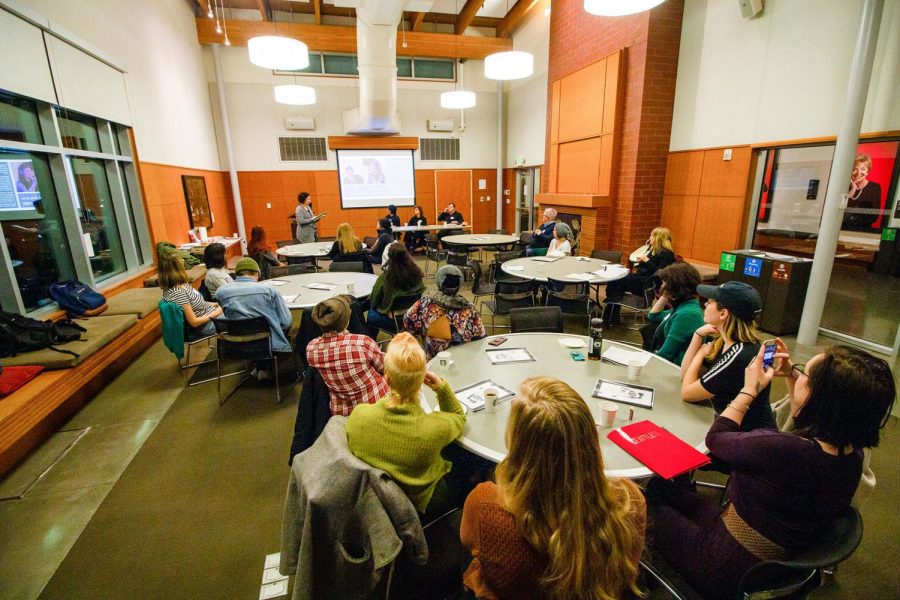Arts Leadership Event Breaks Barriers With Creative Conversations
During the arts leadership book club, a panel of three and attendees explored the connections between arts leadership and psychology in the anthology, “Headcase: LBGTQ Writers & Artists on Mental Health and Wellness.”
The Master of Fine Art (MFA) in Arts Leadership at Seattle University is a unique program that teaches its students the necessary skills to run a successful career in or related to the arts. Some of the skills taught are community engagement, general business and advocacy. The arts leadership program has an Arts Leadership Book Club whose goal is to engage in conversations about equity, intersectionality and professional development; all book club events feature an academic or popular book with an interdisciplinary workshop facilitated by a faculty member.
Last Thursday, the book club event featured “Headcase: LGBTQ Writers & Artists on Mental Health and Wellness” by Stephanie Schroeder and Teresa Theophano. “Headcase” is an anthology comprised of personal stories and art, implementing multiple forms of storytelling to cohesively convey the multifaceted experience of LGBTQ+ people. An integral part of the book is addressing their experiences with mental illness and the ways in which they are mistreated and disenfranchised by the mental health system.
The “Headcase” book club event contained two parts; the first was a panel discussion with two artists— Dan Paz and Philippe Hyojung Kim alongside psychology professor Kevin Krycka. The panel talked about the stories in the book and what resonated with them. The second part used expressive arts for the attendees to reflect on the book’s meaning and interpret it for themselves.
Roxanne Hornbeck is the assistant professor of performing arts and leadership as well as the creator of the Arts Leadership Book Club in 2018. She read “Headcase” over the summer and recognized the diverse and creative lenses in the personal stories that reflected the book club’s values. Hornbeck engineered the event to replicate the personal reflection and artistic mediums that“Headcase” implemented.
“Expressive arts, I believe, are transformational,” Hornbeck said. “Sometimes, we just can’t quite find the words… [even more so] when we start to have more layered complex discussions. We don’t know how to articulate that, but we could draw it, paint it, write a word about it.”
Hornbeck works with expressive arts and there were a variety of materials and mediums provided: watercolors, oil pastels, magazines and modeling clay, to name a few.
“There’s so much history around art being a form of resistance, being a form of getting outside of the binary,” Hornbeck said. “I think it’s important to have spaces for that as we’re tackling difficult concepts and topics and issues.”
Megan Torgerson is a second-year MFA graduate student in the arts leadership program. She also gave some insight into her experience with the two parts of the event.
“I was just kind of processing some of my thoughts and experiences through creating a little piece of art along,” Torgerson said. “I like that there’s space to talk and listen and also to process the book on our own.”
The book club event brought together arts leadership and psychology in the first co-departmental event. This tied into “Headcase” as it contains multiple perspectives, not just those of patients, but also mental health professionals.
Krycka, who is also the associate dean for the College of Arts and Sciences, was one of the panelists for the discussion. During the discussion, he was able to react to the book with his past work experience in the psychoanalyst field.
“The contributors to that volume hit the nail on the head when they expressed in various ways, their frustration with the mental health system, as a system, [which] includes pharmacology and diagnosis and also how they are treated socially,” Krycka said.
Last year, the club focused on bridging the social gap between graduate and undergraduate students. Zoe Chapman is a fourth-year arts leadership major and participated in several of last year’s events.
“Getting to meet other people who are either in a similar spot in their journey, like their academic journey or their career journey, or are much farther ahead of me, it’s been really, really valuable.” Chapman said.
Chapman also gave her own personal insight into what being an arts leadership major entails and what she enjoys, like its flexibility.
“[It] prepares you with a full toolbox of things to go into an arts nonprofit, a curated position, managing a band, but doesn’t even have to be in the arts. It still allows space for a little bit of exploration,” Chapman said.
The Arts Leadership Book Club continues to host workshops to give students insight on professional development as well as safe and open conversations about art and gentrification. The next event is Feb. 23, featuring “Ensemble-Made Chicago: A Guide to Devised Theater,” written by Chloe Johnston and Coya Paz Brownrigg, who are artists, authors and playwrights; Johnston and Brownrigg will be discussing their career.
The editor may be reached at arts@su-spectator.com


